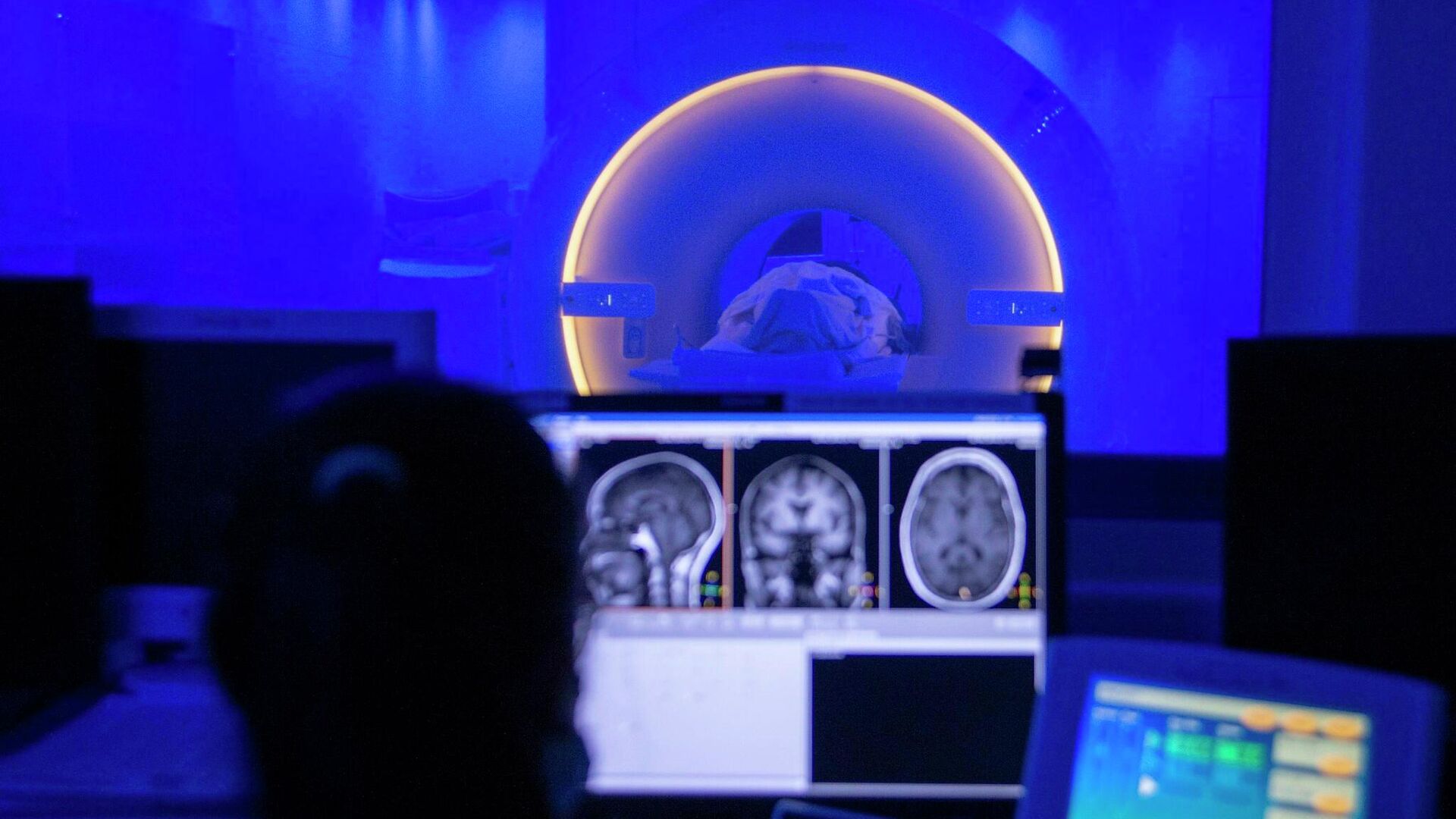https://sputnikglobe.com/20220309/extensive-study-shows-covid-19-causes-brain-shrinkage--dementia-even-among-asymptomatic-cases-1093702960.html
Extensive Study Shows COVID-19 Causes Brain Shrinkage & Dementia Even Among Asymptomatic Cases
Extensive Study Shows COVID-19 Causes Brain Shrinkage & Dementia Even Among Asymptomatic Cases
Sputnik International
Scientists have been extremely interested in the effects of the novel coronavirus on the human brain. Earlier research has suggested that it may be... 09.03.2022, Sputnik International
2022-03-09T02:46+0000
2022-03-09T02:46+0000
2022-03-09T19:38+0000
science & tech
covid-19
human brain
dementia
scientific study
mri
alzheimer's disease
https://cdn1.img.sputnikglobe.com/img/07e6/03/09/1093702936_0:133:2049:1285_1920x0_80_0_0_b12f48ae248afb8fb675131f9dc8ffa3.jpg
Some people who have recovered from COVID-19 have reported a number of temporary, but long-lasting symptoms of brain malfunction, including attention disorders, memory impairment, headaches, sensory disturbances and depression.The latest study from the Wellcome Centre for Integrative Neuroimaging at the University of Oxford has confirmed that coronavirus damages the brain, causing, among other things, shrinkage in size equivalent to as much as a decade of normal aging. These effects can be present even months after recovery.The research is the first major study comparing brain MRI scans of people before and after they contracted COVID-19. It revealed wrinkling and tissue damage in areas of the brain associated with smell and сognitive abilities — even among patients who didn't experience severe symptoms.Researchers studied 785 people aged 51 to 81 who underwent brain scans before and during the pandemic as part of the UK Biobank study. More than half of them tested positive for COVID between the two scans.Compared to 384 uninfected participants, those who tested positive for COVID experienced greater overall cerebrum contraction, including an additional 1.8 percent of the parahippocampal gyrus, a key section responsible for smell, and an additional 0.8 percent of the cerebellum, responsible for mental ability.Impaired signal processing in these areas, known as grey matter, indicates degeneration and can contribute to symptoms such as loss of smell. Those who were infected also generally scored lower on various tests than uninfected people, a tendency the scientists viewed as “concerning.”The question of whether the brain changes are reversible is still to be answered and requires further investigation, but scientists are optimistic as “the brain is ‘plastic’ and can heal itself,” according to Douaud.Serena Spudich, the Gilbert H. Glaser professor of neurology at Yale School of Medicine in New Haven, Connecticut, suggested that “recent research revealed the plasticity of brain connectivity and structure,” which may point to the possibility of renewal of damaged neuronal pathways and total recovery.The results of the study might also not be entirely accurate, as some of the findings could be incidental and have no impact.The effects were more pronounced in the elderly and those who were hospitalized with the disease but were still present in those with mild or asymptomatic infections.Despite the fact that these changes can’t be detected with the naked eye and the brain gradually decreases in size with aging anyway, starting from the age of 30-40, the shrinking is still considerable, as a 0.2 percent reduction in grey matter accounts for about a year of normal aging, and a 2 percent reduction represents about 10 years of aging.In January, researchers from the Grossman School of Medicine at New York University published data from brain studies in people with Covid-19 and Alzheimer's disease. They reportedly assessed the condition of about 250 people with confirmed coronavirus and without any signs of cognitive problems before the disease. They also compared the results with exactly the same study of patients with Alzheimer's disease.The study showed that markers of brain cell damage were three times higher among infected patients than in patients with Alzheimer's disease. The markers’ level was said to be noticeably more critical even in those patients who weren’t hospitalized for long and were safely discharged.The scientists emphasized that the identified disorders are not yet a guarantee of Alzheimer's disease, but the infection, in their opinion, increases this risk.
https://sputnikglobe.com/20220307/study-suggests-possible-genetic-disposition-to-severe-covid-19-cases-1093670738.html
Sputnik International
feedback@sputniknews.com
+74956456601
MIA „Rossiya Segodnya“
2022
News
en_EN
Sputnik International
feedback@sputniknews.com
+74956456601
MIA „Rossiya Segodnya“
Sputnik International
feedback@sputniknews.com
+74956456601
MIA „Rossiya Segodnya“
science & tech, covid-19, human brain, dementia, scientific study, mri, alzheimer's disease
science & tech, covid-19, human brain, dementia, scientific study, mri, alzheimer's disease
Extensive Study Shows COVID-19 Causes Brain Shrinkage & Dementia Even Among Asymptomatic Cases
02:46 GMT 09.03.2022 (Updated: 19:38 GMT 09.03.2022) Scientists have been extremely interested in the effects of the novel coronavirus on the human brain. Earlier research has suggested that it may be particularly dangerous in this regard, with some studies indicating it causes more damage to the cerebrum than Alzheimer's.
Some people who have recovered from COVID-19 have reported a number of temporary, but long-lasting symptoms of brain malfunction, including attention disorders, memory impairment, headaches, sensory disturbances and depression.
The
latest study from the Wellcome Centre for Integrative Neuroimaging at the University of Oxford has confirmed that coronavirus damages the brain, causing, among other things, shrinkage in size equivalent to as much as a decade of normal aging. These effects can be present even months after recovery.
The research is the first major study comparing brain MRI scans of people before and after they contracted COVID-19. It revealed wrinkling and tissue damage in areas of the brain associated with smell and сognitive abilities — even among patients who didn't experience severe symptoms.
Researchers studied 785 people aged 51 to 81 who underwent brain scans before and during the pandemic as part of the UK Biobank study. More than half of them tested positive for COVID between the two scans.
Compared to 384 uninfected participants, those who tested positive for COVID experienced greater overall cerebrum contraction, including an additional 1.8 percent of the parahippocampal gyrus, a key section responsible for smell, and an additional 0.8 percent of the cerebellum, responsible for mental ability.
Impaired signal processing in these areas, known as grey matter, indicates degeneration and can contribute to symptoms such as loss of smell. Those who were infected also generally scored lower on various tests than uninfected people, a tendency the scientists viewed as “concerning.”
“We were quite surprised to see some clear differences in how the brain had changed in the participants who have become infected,” said neuroscientist Gwenaelle Douaud, as cited by Bloomberg.
The question of whether the brain changes are reversible is still to be answered and requires further investigation, but scientists are optimistic as “the brain is ‘plastic’ and can heal itself,” according to Douaud.
Serena Spudich, the Gilbert H. Glaser professor of neurology at Yale School of Medicine in New Haven, Connecticut, suggested that “recent research revealed the plasticity of brain connectivity and structure,” which may point to the possibility of renewal of damaged neuronal pathways and total recovery.
“We are fortunate to have extremely resilient brains that can function with many potential insults without experiencing any impairment,” she explained. “Hopefully, these neuroimaging findings equate to few clinical consequences in most people who are infected with SARS-CoV-2.”
The results of the study might also not be entirely accurate, as some of the findings could be incidental and have no impact.
The effects were more pronounced in the elderly and those who were hospitalized with the disease but were still present in those with mild or
asymptomatic infections.
Despite the fact that these changes can’t be detected with the naked eye and the brain gradually decreases in size with aging anyway, starting from the age of 30-40, the shrinking is still considerable, as a 0.2 percent reduction in grey matter accounts for about a year of normal aging, and a 2 percent reduction represents about 10 years of aging.
In January,
researchers from the Grossman School of Medicine at New York University published data from brain studies in people with Covid-19 and Alzheimer's disease. They reportedly assessed the condition of about 250 people with confirmed coronavirus and without any signs of cognitive problems before the disease. They also compared the results with exactly the same study of patients with Alzheimer's disease.
The study showed that markers of brain cell damage were three times higher among infected patients than in patients with Alzheimer's disease. The markers’ level was said to be noticeably more critical even in those patients who weren’t hospitalized for long and were safely discharged.
The scientists emphasized that the identified disorders are not yet a guarantee of Alzheimer's disease, but the infection, in their opinion, increases this risk.


